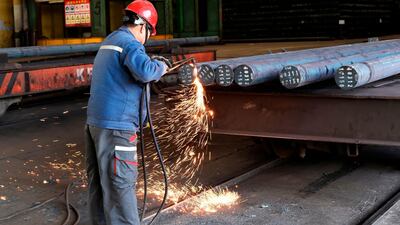The global economy will slow to 3.7 per cent in the medium term after recording its fastest pace of growth last year since 2011, as a result of the unwinding of US stimulus and a deceleration of advanced economies, the International Monetary Fund said on Tuesday.
“Once the cyclical upswing and US fiscal stimulus have run their course, prospects for advanced economies remain subdued, given their slow potential growth,” the Washington-based lender said. “In emerging market and developing economies, in contrast, growth will remain close to its 2018–19 level as the gradual recovery in commodity exporters and a projected increase in India’s growth provide some offset to China’s gradual slowdown and emerging Europe’s return to its lower-trend growth rate.”
The fund also warned of negative repercussions from protectionist policies and potential trade wars among the biggest economies that could derail growth prospects that need trade to fuel expansion.
Global growth forecasts were maintained at 3.9 per cent for this year and next, up from a stronger-than-expected expansion of 3.8 in 2017 thanks to a rebound in trade. The fund’s projections are more bullish than that of the Institute of International Finance, which has projected global growth of 3.5 per cent this year and 3.4 per cent in 2019.
_________________
Read more:
World Bank revises up Mena growth forecast on global economy, oil prices
Standard Chartered forecasts GCC economies to grow 2% this year
_________________
“Resurgent investment spending in advanced economies and an end to the investment decline in some commodity-exporting emerging market and developing economies were important drivers of the uptick in global GDP growth and manufacturing activity [in 2017],” said the report.
In January, the IMF revised up its projections for global economic growth for 2018 and 2019 on the back of an unexpected uptick in Asia and Europe as well as US tax cuts that are set to propel growth in the country along with its trading partners.
But an unfolding trade war between the US and China, the world's two biggest economies, could hurt global growth as both countries seek to slap protectionist tariffs that would dampen trade.
“The prospect of trade restrictions and counter-restrictions threatens to undermine confidence and derail global growth prematurely,” said Maurice Obstfeld, the fund’s economic counsellor and director of the research department.
“That major economies are flirting with trade war at a time of widespread economic expansion may seem paradoxical—especially when the expansion is so reliant on investment and trade.”
In the Middle East, North Africa, Afghanistan, and Pakistan region, growth is forecast to rise from 2.6 per cent in 2017 to 3.4 per cent in 2018 and 3.7 per cent in 2019, but it will stabilise at about 3.6 per cent in the medium term.
“The need for fiscal consolidation as a result of structurally lower oil revenues, security challenges, and structural impediments weigh on the medium-term prospects for many economies in the region,” the report said.
In the Middle East and North Africa growth for 2018 and 2019 is forecast at 3.2 per cent and 3.6 per cent respectively, up from 2.2 per cent in 2017.
In Saudi Arabia, the biggest Arab economy which contracted 0.7 per cent last year, 2018 growth was revised up to 1.7 per cent, a 0.1 percentage point increase from the January projections. Growth in 2019 was lowered to 1.9 per cent from 2.2 per cent in the January forecast.
Growth in the UAE, which is forecast to have slowed to 0.5 per cent in 2017, will accelerate to 2 per cent in 2018 and 3 per cent in 2019, according to the fund. The Washington-based IIF is projecting growth of 2.1 per cent for this year and 2.6 for 2019 and the World Bank is forecasting growth of 2.5 and 3.2 per cent for 2018 and 2019, respectively.
The UAE is forecasting growth of 3.6 to 3.9 per cent for this year.

